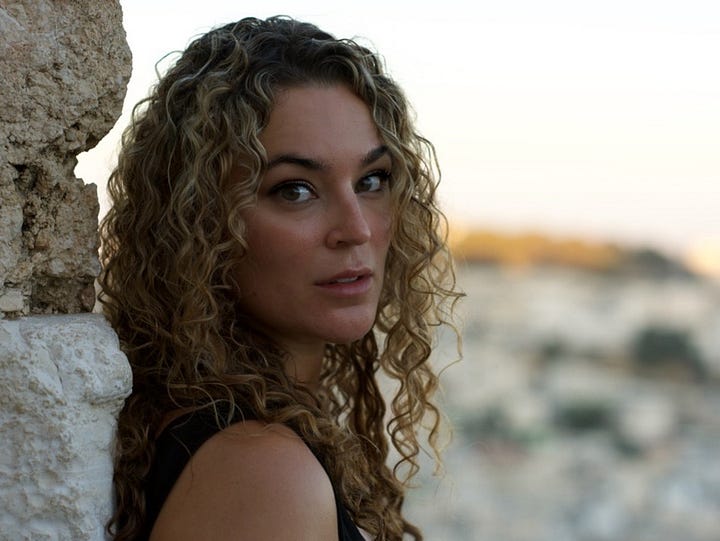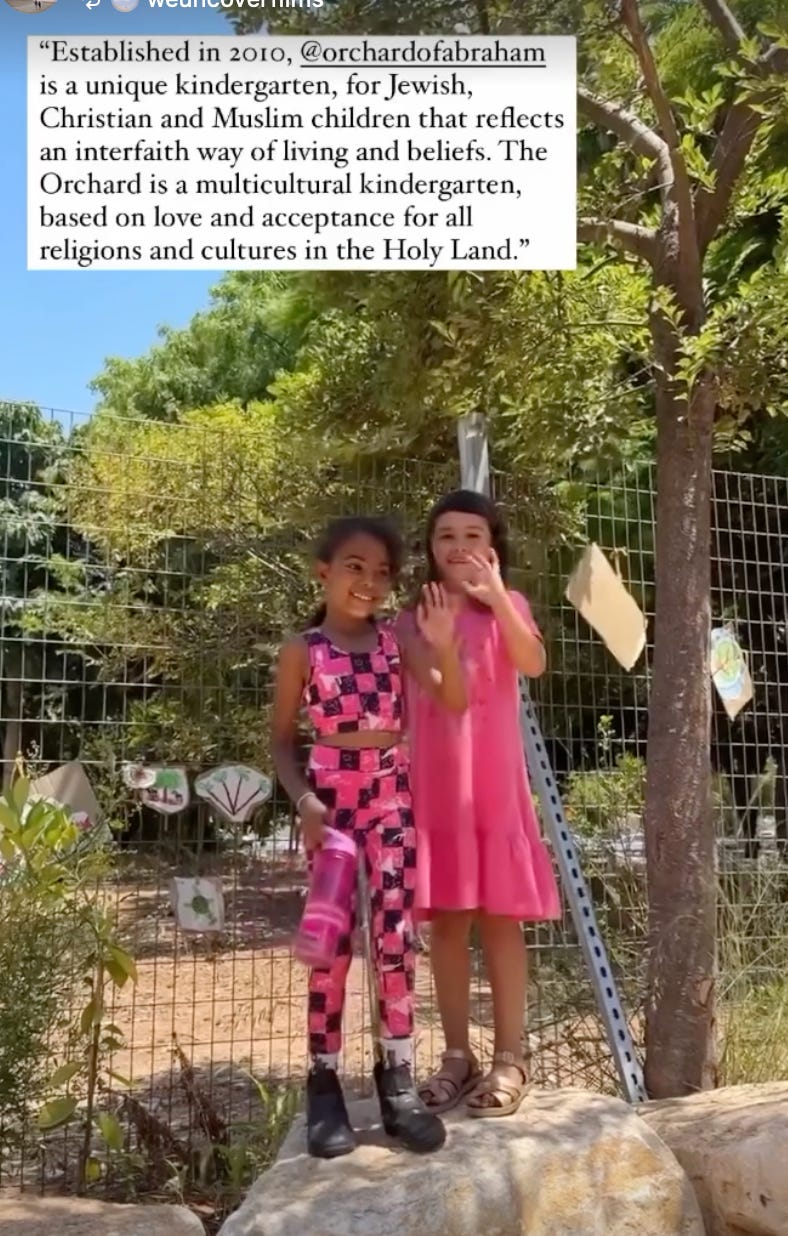The Other: A Film on Israelis & Palestinians Seeing Humanity in Each Other
My Conversation with Joy Sela on Bridging Divides Through Film
What does it take to see humanity in someone you’ve been taught to fear or even hate?
A few months ago, at the New York Jewish Film Festival, I watched The Other at the Walter Reade Theater in Lincoln Center. Long after the credits rolled, I sat in silence, absorbing the weight of what I had just witnessed. This documentary is not just about conflict—it’s about the courage to move beyond it. From 2017 to 2024, Joy Sela follows Israeli and Palestinian peacebuilders, activists, academics, former fighters, and anti-occupation advocates who, despite deep-rooted pain and division, come together in pursuit of something that often feels impossible: understanding, connection, and the hope for peace.
But The Other doesn’t just tell their stories—it returns to them, asking what peace, justice, and co-resistance look like in the aftermath of October 7th. The film revisits Ahmed Helou, a former Hamas member from Gaza who became a peace activist—only to lose 60 family members in Gaza since the film’s release. It also introduces voices like Maoz Inon, an Israeli whose parents were murdered on October 7th, and Standing Together, a Jewish-Arab movement fighting for equality and social justice in Israel-Palestine. Their experiences make clear that peace is not a passive ideal—it requires courage, persistence, and the willingness to seek understanding even after profound loss.
In a world that feels more fractured than ever, The Other is a powerful reminder of what can happen when we choose to listen instead of fight, to see humanity instead of enemies. It underscores how stories—whether through film, books, or other mediums—have the power to open our hearts, challenge our perspectives, and deepen our understanding of one another. These narratives guide us toward empathy, allowing us to see beyond our divisions and recognize the shared humanity we all possess.
I had the privilege of interviewing the film’s director, Joy Sela, about her journey in making this extraordinary documentary, the power of storytelling, and what it truly means to meet ‘the other’—because sometimes, stories can do what politics cannot: remind us of our shared humanity.
***If the trailer doesn’t play, you can watch it here.
Why did you make the film “The Other” and tell this story?
This documentary is the culmination of my own personal journey. Growing up in an American-Israeli home and spending a part of my life living in Israel, I was well-versed in my Jewish/Israeli culture and narrative.
As I immersed myself deeper into the activism and peace-building communities, I was confronted with a new reality I had not yet known in this land, and my whole paradigm shifted. I began focusing heavily on the Palestinian culture & narrative as I filmed and engaged in community within the West Bank and Palestinian areas within Israel. When faced with meeting my "other" and when faced with the reality on the ground in both mine and their homeland, I experienced the same transformation that I was documenting in my interview subjects.
It is much easier to remain in your righteousness and root down into your own narrative, pain, and suffering. It is much harder to hold space for a truth that contradicts your own and acknowledge the pain and suffering from “the other side” while still experiencing your own. This is the extraordinary example set forth by the courageous individuals in this film.
Given the enormity of recent events, their message of humanity has become even more relevant. In the face of such atrocities and polarization, The Other showcases another reality: an entire ecosystem of peacebuilders and activists in Israel/Palestine working together towards a better future predicated on peace and justice for all. It’s time we hear them.


What were some of the biggest challenges you faced during the filmmaking process—logistically, emotionally, or politically?
The whole course of my journey in making this film was filled with challenges and surprises. Had I known what I would encounter beforehand, I am not sure the film would be here today. There was the obviously challenging subject matter involving death, violence, oppression, and trauma, coupled with the hurdles to filming in an occupied territory with a military presence, navigating the nuances culturally as well as accurately portraying and working within an unequal power system. I rode the line of what was legal -- producing a film in and out of a country and occupied territory -- and pushed the envelope as far as I could to platform these stories and voices. I also acknowledge my privilege to be able to freely move within Israel and in and out of the Palestinian territories- I don’t take that lightly and wanted to make sure I used that access to the utmost level to get these stories told.
Not to mention the polarizing nature of my background and how that affected me personally, with loved ones, and in the diaspora community.
There’s a powerful moment in the film that highlights the hidden or misrepresented stories of both Palestinians and Israelis. How do you think misinformation and the erasure of narratives impact public perception and, ultimately, the possibility of peace?
It has a huge impact. First and foremost, people need to be heard, understood, and acknowledged. Whether it’s the micro—an individual person—or the macro—a group of people or community—it is the necessary first step to get anywhere. You can’t empathize or mobilize into any action until that first step is taken. So, I felt it was of the utmost importance.
What was the process of gaining trust with your subjects, particularly those who may have been hesitant to share their perspectives?
I spent years on the ground building trust, and I didn’t take the honor and responsibility of sharing these deeply personal and sensitive stories lightly. I think I had such a deep curiosity and interest in learning from my subjects, understanding their experiences, and hearing their stories that it came through and was disarming for them. I also spent long periods of time interviewing– I wasn’t in and out. Sometimes, I would spend the whole day with a subject and have the camera rolling for hours, and somewhere in the middle, we got our best material. I also participated in joint co-resistance work and peace-building so subjects became comfortable and familiar with me in their spaces and could see that I deeply cared for the cause and also wasn’t going to cut any corners with what was important for them to get across. I also remained in touch with everyone, and they knew I would not release anything that felt inauthentic to them or put them in danger. It was an ongoing process, and to my surprise, none of the subjects requested anything to be changed or removed once we completed editing the film.
Were there any moments or interviews that deeply shifted your own perspective on the Israeli-Palestinian conflict?
I think most of them did, and many are in the film. While we had a total of 85 hours of interview footage, I wish we could share so much more.
What role do you think storytelling and film can play in fostering empathy and dialogue in deeply divided societies?
I believe storytelling and film play a crucial role in fostering empathy and dialogue in deeply divided societies because they help humanize "the other." When you connect with someone on a human-to-human level, it becomes impossible to ignore their humanity. This connection challenges the polarized "us vs. them" mindset and begins to break down those walls of separation.
The Other serves as a tool for transformation, offering a shortcut for viewers to confront their own conditioning and belief systems. It invites them to transcend the illusion of separation. Moving beyond "us versus them" thinking, especially within an unequal power structure, can often be seen as passive or a cop-out. But after spending years working on this project, I can tell you with certainty that it’s far more challenging than taking the alternative route.
If you could have a conversation with someone who refuses to watch this film because of their own biases, what would you say to them?
That is their own choice, and I wouldn’t try to impose or force anything on them, but I would tell them they may be surprised.
What are you hoping your audience will take away from the film?
As I said above, it’s really important for me as a filmmaker, in general, and specifically with this topic, not to impose my own viewpoint or expected interpretation onto the viewer. I made this, and now it’s up to each viewer to have their own experience. Many people share that they were surprised by the film and what they saw, that it was healing or emotionally moving, and that it stayed with them.
For people moved by The Other, what are some tangible ways to support peace efforts or engage more deeply with the issues raised in the film?
You can visit weuncoverfilms.com/theother to support the film, sign up for the newsletter for official release updates, and learn about upcoming screenings & educational programming. To get involved with any of the organizations featured in the film, they’re listed on our website.
How do you see your work evolving in the future? Are there other stories or regions you’re drawn to exploring?
Never one to keep it light, despite promising myself I would never make another film this hard again, I am in development for another project in this region! Accepting that’s what I’m interested in and it’s where my creative talent works best, I also have other projects coming up that are focused on individual or collective transformation and are disruptive to outdated belief systems.










Love that you are sharing this film, and this work in such a brilliant way. I so appreciate that you use your platform and your voice to amplify causes and voices in a way that is artistic, beautiful, moving and important for educating us all.
Adding it to my watch list now.